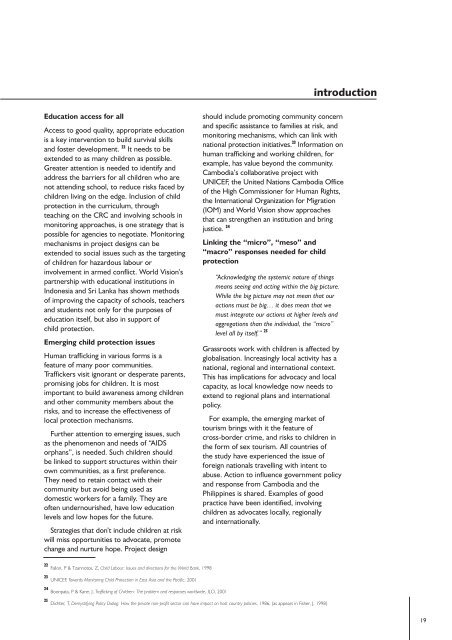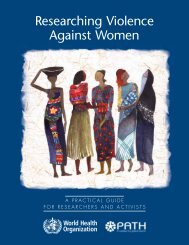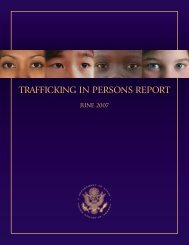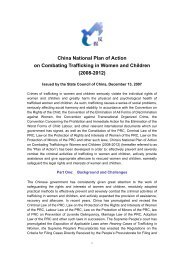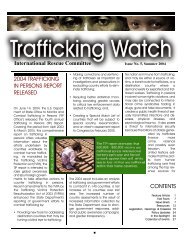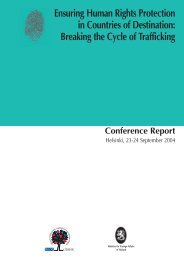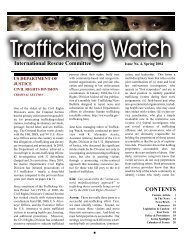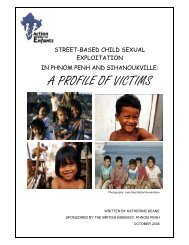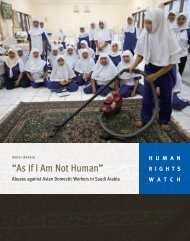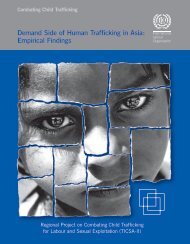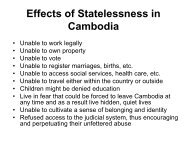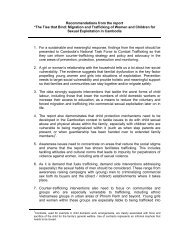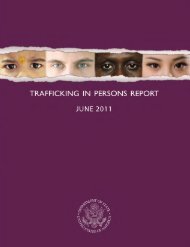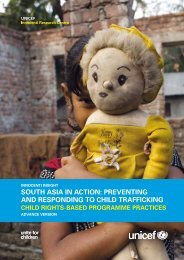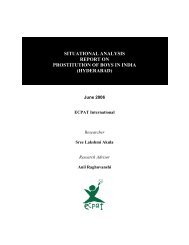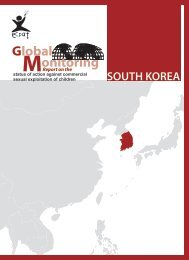Download PDF - Violence Against Children - East Asia and the ...
Download PDF - Violence Against Children - East Asia and the ...
Download PDF - Violence Against Children - East Asia and the ...
You also want an ePaper? Increase the reach of your titles
YUMPU automatically turns print PDFs into web optimized ePapers that Google loves.
introduction<br />
Education access for all<br />
Access to good quality, appropriate education<br />
is a key intervention to build survival skills<br />
<strong>and</strong> foster development. 22 It needs to be<br />
extended to as many children as possible.<br />
Greater attention is needed to identify <strong>and</strong><br />
address <strong>the</strong> barriers for all children who are<br />
not attending school, to reduce risks faced by<br />
children living on <strong>the</strong> edge. Inclusion of child<br />
protection in <strong>the</strong> curriculum, through<br />
teaching on <strong>the</strong> CRC <strong>and</strong> involving schools in<br />
monitoring approaches, is one strategy that is<br />
possible for agencies to negotiate. Monitoring<br />
mechanisms in project designs can be<br />
extended to social issues such as <strong>the</strong> targeting<br />
of children for hazardous labour or<br />
involvement in armed conflict. World Vision’s<br />
partnership with educational institutions in<br />
Indonesia <strong>and</strong> Sri Lanka has shown methods<br />
of improving <strong>the</strong> capacity of schools, teachers<br />
<strong>and</strong> students not only for <strong>the</strong> purposes of<br />
education itself, but also in support of<br />
child protection.<br />
Emerging child protection issues<br />
Human trafficking in various forms is a<br />
feature of many poor communities.<br />
Traffickers visit ignorant or desperate parents,<br />
promising jobs for children. It is most<br />
important to build awareness among children<br />
<strong>and</strong> o<strong>the</strong>r community members about <strong>the</strong><br />
risks, <strong>and</strong> to increase <strong>the</strong> effectiveness of<br />
local protection mechanisms.<br />
Fur<strong>the</strong>r attention to emerging issues, such<br />
as <strong>the</strong> phenomenon <strong>and</strong> needs of “AIDS<br />
orphans”, is needed. Such children should<br />
be linked to support structures within <strong>the</strong>ir<br />
own communities, as a first preference.<br />
They need to retain contact with <strong>the</strong>ir<br />
community but avoid being used as<br />
domestic workers for a family. They are<br />
often undernourished, have low education<br />
levels <strong>and</strong> low hopes for <strong>the</strong> future.<br />
Strategies that don’t include children at risk<br />
will miss opportunities to advocate, promote<br />
change <strong>and</strong> nurture hope. Project design<br />
should include promoting community concern<br />
<strong>and</strong> specific assistance to families at risk, <strong>and</strong><br />
monitoring mechanisms, which can link with<br />
national protection initiatives. 23 Information on<br />
human trafficking <strong>and</strong> working children, for<br />
example, has value beyond <strong>the</strong> community.<br />
Cambodia’s collaborative project with<br />
UNICEF, <strong>the</strong> United Nations Cambodia Office<br />
of <strong>the</strong> High Commissioner for Human Rights,<br />
<strong>the</strong> International Organization for Migration<br />
(IOM) <strong>and</strong> World Vision show approaches<br />
that can streng<strong>the</strong>n an institution <strong>and</strong> bring<br />
justice. 24<br />
Linking <strong>the</strong> “micro”, “meso” <strong>and</strong><br />
“macro” responses needed for child<br />
protection<br />
“Acknowledging <strong>the</strong> systemic nature of things<br />
means seeing <strong>and</strong> acting within <strong>the</strong> big picture.<br />
While <strong>the</strong> big picture may not mean that our<br />
actions must be big… it does mean that we<br />
must integrate our actions at higher levels <strong>and</strong><br />
aggregations than <strong>the</strong> individual, <strong>the</strong> “micro”<br />
level all by itself.” 25<br />
Grassroots work with children is affected by<br />
globalisation. Increasingly local activity has a<br />
national, regional <strong>and</strong> international context.<br />
This has implications for advocacy <strong>and</strong> local<br />
capacity, as local knowledge now needs to<br />
extend to regional plans <strong>and</strong> international<br />
policy.<br />
For example, <strong>the</strong> emerging market of<br />
tourism brings with it <strong>the</strong> feature of<br />
cross-border crime, <strong>and</strong> risks to children in<br />
<strong>the</strong> form of sex tourism. All countries of<br />
<strong>the</strong> study have experienced <strong>the</strong> issue of<br />
foreign nationals travelling with intent to<br />
abuse. Action to influence government policy<br />
<strong>and</strong> response from Cambodia <strong>and</strong> <strong>the</strong><br />
Philippines is shared. Examples of good<br />
practice have been identified, involving<br />
children as advocates locally, regionally<br />
<strong>and</strong> internationally.<br />
22 Fallon, P & Tzannotos, Z, Child Labour: Issues <strong>and</strong> directions for <strong>the</strong> World Bank, 1998<br />
23 UNICEF, Towards Monitoring Child Protection in <strong>East</strong> <strong>Asia</strong> <strong>and</strong> <strong>the</strong> Pacific, 2001<br />
24 Boonpata, P & Kane, J, Trafficking of <strong>Children</strong>: The problem <strong>and</strong> responses worldwide, ILO, 2001<br />
25 Dichter, T, Demystifying Policy Dialog: How <strong>the</strong> private non-profit sector can have impact on host country policies, 1986, (as appears in Fisher, J, 1998)<br />
19


